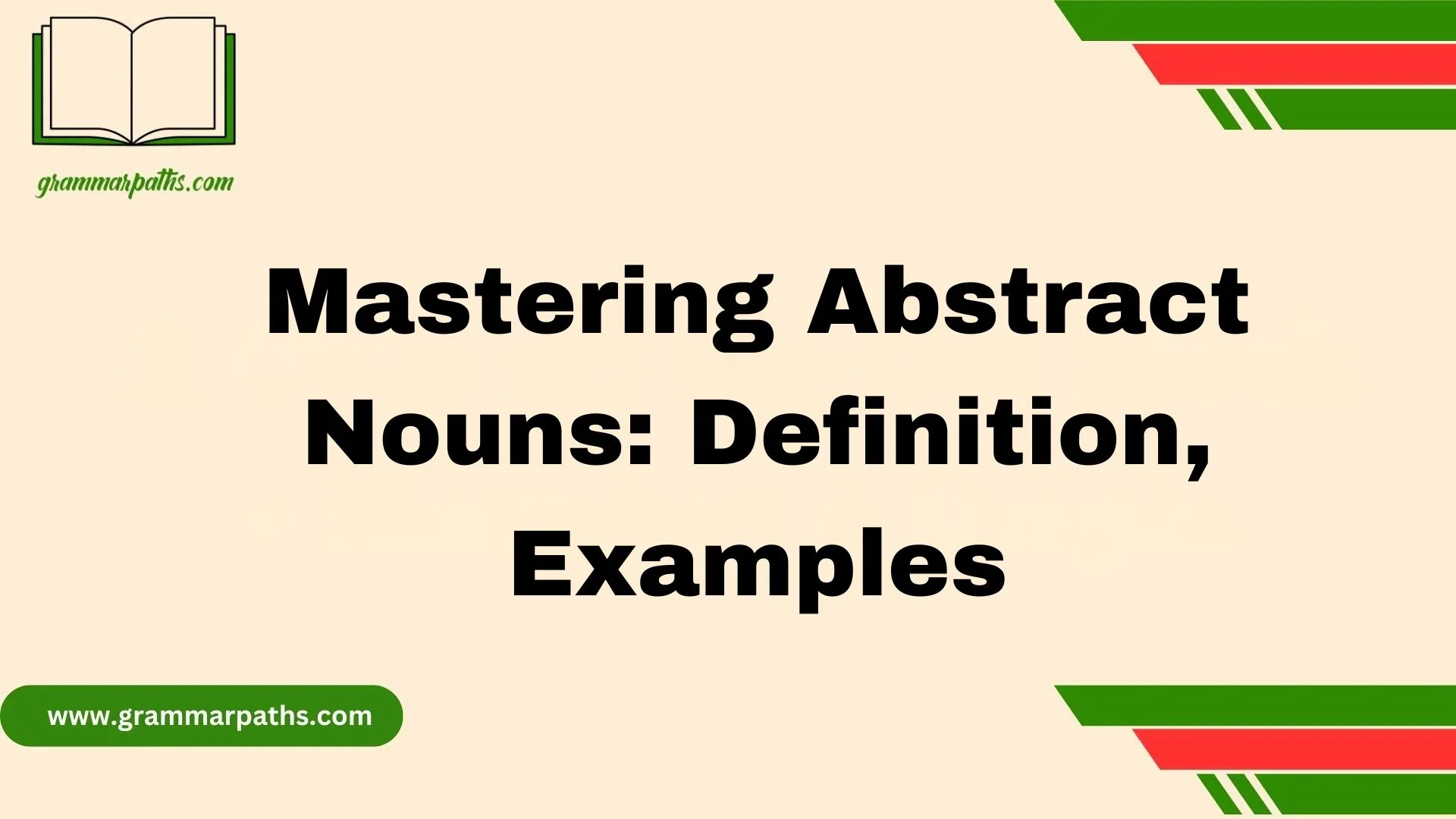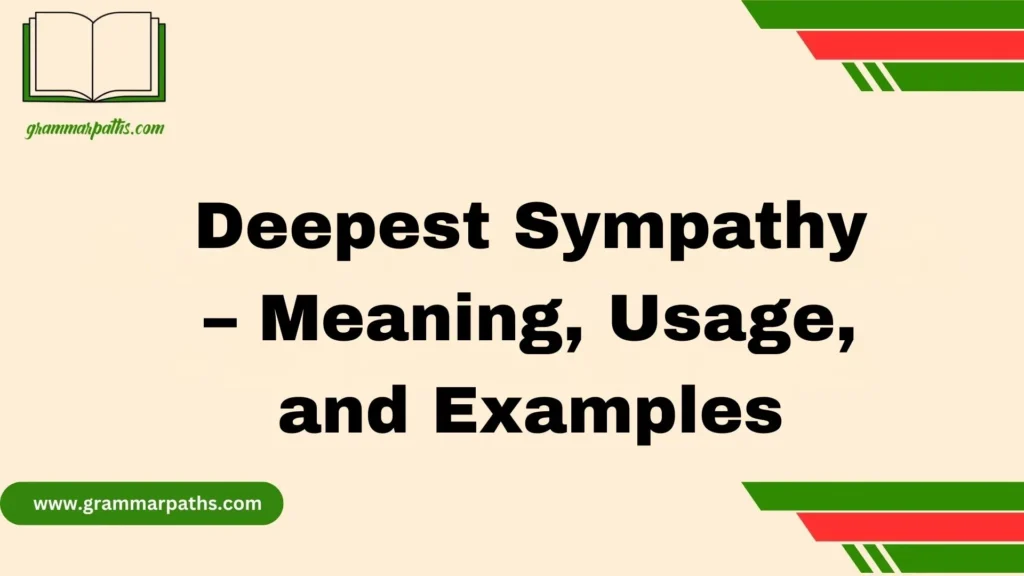Mastering Abstract Nouns: Definition, Examples, and Practical Usage is an essential skill for anyone aiming to improve their communication, writing, and language learning abilities. Unlike concrete nouns, which refer to things we can see or touch, abstract nouns deal with ideas, emotions, qualities, and concepts that exist beyond the physical world. Words like love, freedom, happiness, and knowledge are powerful examples of abstract nouns because they capture human experiences that shape our thoughts and actions.
Understanding abstract nouns not only enriches your vocabulary but also helps you express complex ideas more clearly. In both academic writing and creative expression, these nouns allow you to communicate emotions, values, and principles in a precise way. For instance, when you talk about justice, you’re not pointing to an object, but rather to a shared concept that influences societies and cultures.
By exploring their definition, identifying useful examples, and practicing practical usage, you can strengthen your ability to write with clarity and depth. Whether you are a student, teacher, or professional, mastering abstract nouns will empower you to convey meaning, persuasion, and insight effectively in both spoken and written communication.
What Is an Abstract Noun? Definition Simplified
An abstract noun is a word that represents a concept, idea, quality, or emotion rather than something tangible. Unlike concrete nouns, abstract nouns cannot be touched, seen, heard, smelled, or tasted.
Examples:
| Abstract Noun | Concept Represented |
| Freedom | The state of being free from restrictions |
| Love | Deep affection or care for someone |
| Courage | The ability to face danger or fear |
| Justice | Fair treatment according to law or morality |
Abstract nouns allow us to communicate complex ideas, reflect on emotions, and discuss concepts like time, knowledge, or ethics. They provide depth to language and make expression richer and more nuanced.
The Core Concept of Abstract Nouns
At their core, abstract nouns encapsulate things we think about rather than things we can perceive. They answer questions like What is happiness? or What defines honesty?
For instance, while we can feel happiness, we cannot physically grasp it. Similarly, justice is observable in actions but exists as a concept. Recognizing abstract nouns enhances both comprehension and expression.
Key characteristics of abstract nouns:
- Represent ideas, feelings, or qualities.
- Cannot be experienced with the five senses.
- Often derived from adjectives, verbs, or other nouns.
By grasping this, you can better identify abstract nouns in literature, daily conversation, and formal writing.
Common Categories of Abstract Nouns
Abstract nouns are not random; they often fall into recognizable categories that reflect the spectrum of human experience.
Emotions
Emotions are the most common type of abstract noun because they capture how we feel internally.
- Happiness
- Anger
- Sadness
- Excitement
Qualities
Qualities describe traits or characteristics of people, objects, or experiences.
- Honesty
- Bravery
- Patience
- Kindness
States or Conditions
These nouns reflect circumstances, situations, or conditions.
- Freedom
- Poverty
- Health
- Friendship
Ideas and Concepts
These nouns express abstract thought, philosophy, or general notions.
- Democracy
- Time
- Justice
- Knowledge
Concrete Nouns vs. Abstract Nouns: Spotting the Difference
Understanding abstract nouns becomes easier when compared to concrete nouns, which represent physical objects.
| Concrete Noun | Abstract Noun | Difference |
| Book | Knowledge | Book can be touched; knowledge is a concept |
| Car | Freedom | Car is tangible; freedom is intangible |
| Smile | Happiness | Smile is visible; happiness is experienced |
| Medal | Courage | Medal is a physical award; courage is a personal quality |
Quick Tip: Ask yourself if the noun can be experienced through the senses. If not, it’s likely abstract.
Mini-Exercise: Identify the abstract nouns in these sentences:
- Her kindness inspired everyone around her.
- Time waits for no one.
- The lion showed remarkable courage.
- Science drives innovation.
Answers: kindness, time, courage, science
Formation of Abstract Nouns
Many abstract nouns are formed by adding suffixes to verbs or adjectives. Understanding this can help you recognize them easily.
Common Suffixes:
| Suffix | Examples | Origin |
| -ness | happiness, darkness | Adjective → Noun |
| -ity | curiosity, generosity | Adjective → Noun |
| -tion | education, celebration | Verb → Noun |
| -hood | childhood, brotherhood | Noun → Noun |
| -ship | friendship, leadership | Noun → Noun |
Example Transformations:
- Brave → Bravery
- Honest → Honesty
- Educate → Education
This knowledge helps in expanding vocabulary and crafting more precise, expressive sentences.
Abstract Nouns in Daily Communication
Even though abstract nouns are intangible, they dominate everyday communication. From casual conversation to professional writing, they provide depth.
Examples in Daily Life:
- “Her patience is admirable.”
- “We value honesty in our team.”
- “Time and freedom are precious.”
Idioms Using Abstract Nouns:
- “Actions speak louder than words” → emphasizes honesty or integrity.
- “The road to success is paved with patience” → highlights perseverance.
- “Time heals all wounds” → illustrates time as an abstract concept influencing healing.
Case Study: In leadership seminars, trainers often emphasize abstract nouns like trust, responsibility, and vision to inspire action, showing that abstract nouns are powerful tools for influence.
Exploring Emotions, Qualities, Time, and Ideas
Emotions
Emotions are central to human experience and language. Words like joy, anger, and fear allow us to communicate feelings precisely.
Qualities
Qualities describe personality traits or moral standards. Using abstract nouns like honesty, bravery, or kindness enriches storytelling and persuasive writing.
Time
Time is a tricky abstract noun. Though we measure it, it remains intangible. Expressions like time flies or a moment of truth rely on abstract conceptualization.
Ideas and Concepts
Conceptual nouns like justice, democracy, knowledge, or truth appear frequently in formal writing, debates, and philosophical discussions.
Cultural and Social Abstract Nouns
Abstract nouns often reflect societal values and cultural movements. They help express collective beliefs or shared ideals.
Examples:
- Freedom → central to political movements worldwide.
- Equality → foundational in civil rights discussions.
- Peace → a universal aspiration reflected in art, speeches, and literature.
Quote:
“Freedom is never voluntarily given by the oppressor; it must be demanded by the oppressed.” – Martin Luther King Jr.
Insight: Literature, speeches, and social media heavily rely on abstract nouns to communicate ideals that resonate universally.
Practical Exercises and Worksheets
Exercise 1: Identify the Abstract Noun
- Courage is the key to success.
- Friendship enriches life.
- Technology drives progress.
- Happiness cannot be bought.
Answers: courage, friendship, progress, happiness
Exercise 2: Transform Words into Abstract Nouns
- Brave → _______
- Educate → _______
- Honest → _______
Answers: bravery, education, honesty
Exercise 3: Fill-in-the-Blank
- _______ is the foundation of trust. (Honesty)
- The child’s _______ amazed the teachers. (Curiosity)
- We fight for _______ in society. (Equality)
These exercises strengthen recognition and usage of abstract nouns in context.
Related Language Constructs
Abstract nouns intersect with other grammar concepts:
- Gerunds as abstract nouns: “Running is fun” (Running acts as an abstract noun).
- Collective nouns vs. abstract nouns: Collective nouns group things (team, flock), whereas abstract nouns express ideas (teamwork, loyalty).
Comparison Table:
| Type | Example | Notes |
| Abstract Noun | Courage | Intangible quality |
| Gerund as Noun | Running | Activity treated as concept |
| Collective Noun | Team | Group of tangible entities |
Conclusion
Mastering abstract nouns is more than just a grammar lesson—it’s a gateway to stronger expression, clearer communication, and deeper understanding of language. By learning the definition, practicing with examples, and applying their practical usage, you gain the ability to capture emotions, ideas, and concepts that shape human thought. Whether you are improving your academic writing, crafting powerful stories, or developing better public speaking skills, abstract nouns help you communicate beyond the visible world. With practice, these words can enrich your vocabulary and give your sentences greater meaning and impact.
FAQs
Q1. What is an abstract noun in simple words?
An abstract noun is a word that names an idea, emotion, quality, or concept that you cannot see or touch, such as happiness or freedom.
Q2. How are abstract nouns different from concrete nouns?
Concrete nouns refer to things you can see, hear, touch, taste, or smell, while abstract nouns represent intangible concepts.
Q3. Why are abstract nouns important in writing?
They allow writers to express feelings, principles, and values, making communication more powerful and meaningful.
Q4. Can you give 5 examples of abstract nouns?
Yes, examples include love, wisdom, courage, peace, and justice.
Q5. How can I practice using abstract nouns?
You can practice by writing sentences or paragraphs that use abstract nouns to explain emotions, beliefs, or ideas.

Emma Brooke is a passionate language expert and contributor at GrammarPaths.com, where she helps learners navigate the complexities of English grammar, idioms, and effective writing. With a strong academic background and years of teaching experience, Emma excels at turning tricky grammar rules into simple, practical lessons that readers can easily grasp.












